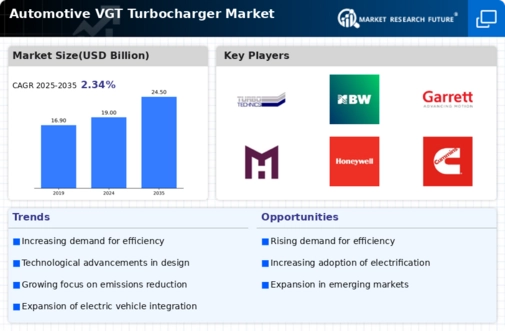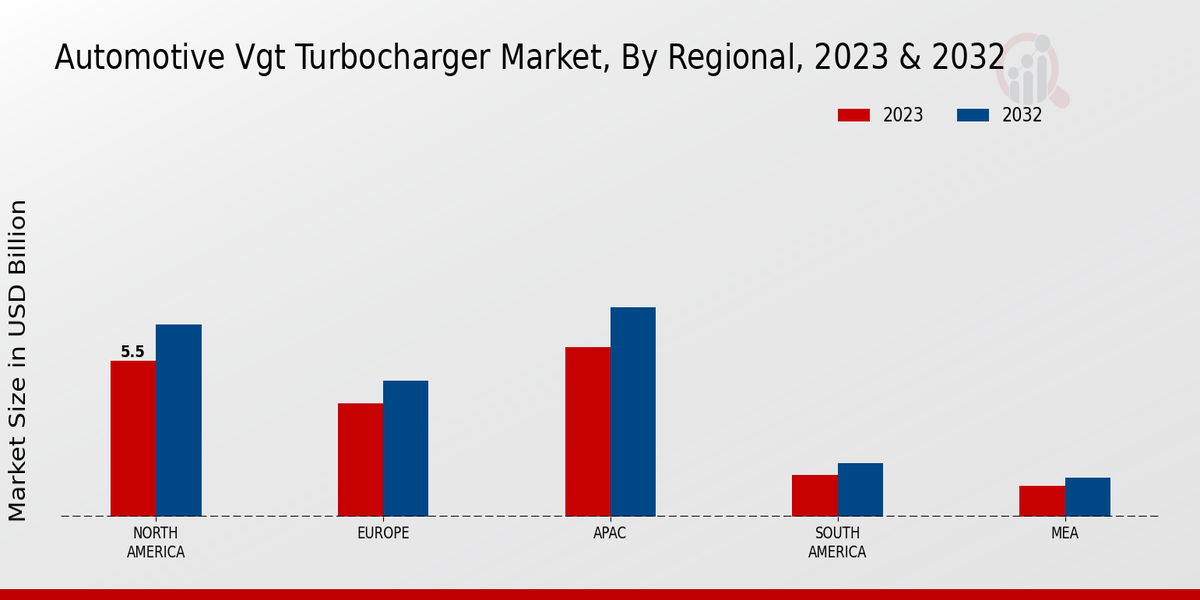Market Growth Projections
The Global Automotive VGT Turbocharger Market Industry is projected to exhibit steady growth over the next decade. With a market size anticipated to reach 24.5 USD Billion by 2035, the industry is expected to witness a CAGR of 2.34% from 2025 to 2035. This growth is driven by various factors, including technological advancements, increasing demand for fuel-efficient vehicles, and stringent emission regulations. The market's expansion reflects the automotive industry's ongoing transformation towards more sustainable and efficient technologies. As manufacturers continue to innovate and adapt to changing consumer preferences, the VGT turbocharger market is likely to thrive.
Stringent Emission Regulations
The Global Automotive VGT Turbocharger Market Industry is significantly influenced by stringent emission regulations imposed by governments worldwide. These regulations aim to reduce greenhouse gas emissions and promote cleaner technologies. As a result, automotive manufacturers are increasingly adopting VGT turbochargers, which facilitate compliance with these regulations by improving engine efficiency and reducing emissions. The growing emphasis on environmental sustainability is likely to drive the market forward, as manufacturers seek to enhance their product offerings. This trend suggests a robust growth trajectory for the market, with expectations of reaching 19.0 USD Billion in 2024.
Growth in Automotive Production
The Global Automotive VGT Turbocharger Market Industry is poised for growth due to the overall increase in automotive production globally. As manufacturers ramp up production to meet rising consumer demand, the integration of VGT turbochargers becomes more prevalent. These turbochargers not only enhance engine performance but also comply with evolving emission standards. The automotive sector's expansion is indicative of a broader economic recovery, which is likely to bolster the market. With projections indicating a market size of 19.0 USD Billion in 2024, the growth in automotive production is expected to sustain the demand for VGT turbochargers in the coming years.
Rising Popularity of Diesel Engines
The Global Automotive VGT Turbocharger Market Industry is witnessing a resurgence in the popularity of diesel engines, particularly in commercial vehicles. Diesel engines are known for their fuel efficiency and torque characteristics, making them ideal for heavy-duty applications. The integration of VGT technology enhances the performance of diesel engines by providing better throttle response and reducing turbo lag. This trend is expected to contribute to the market's growth, as the demand for diesel-powered vehicles remains strong. Consequently, the market is projected to expand, potentially reaching 24.5 USD Billion by 2035, driven by the increasing adoption of VGT turbochargers in diesel applications.
Increasing Demand for Fuel Efficiency
The Global Automotive VGT Turbocharger Market Industry is experiencing a notable surge in demand for fuel-efficient vehicles. As consumers increasingly prioritize fuel economy, manufacturers are responding by integrating Variable Geometry Turbochargers (VGT) into their engine designs. This technology enhances engine performance while reducing emissions, aligning with global environmental standards. In 2024, the market is projected to reach 19.0 USD Billion, driven by the automotive industry's commitment to sustainability. Furthermore, as regulations tighten, the adoption of VGT turbochargers is likely to accelerate, contributing to a projected market growth rate of 2.34% CAGR from 2025 to 2035.
Technological Advancements in Turbocharging
Technological innovations are significantly shaping the Global Automotive VGT Turbocharger Market Industry. Advances in materials and manufacturing processes have led to the development of more efficient and durable turbochargers. For instance, the introduction of lightweight materials reduces the overall weight of the turbocharger, enhancing vehicle performance. Additionally, improved design techniques allow for better airflow management, which optimizes engine efficiency. As a result, the market is expected to grow, reaching 24.5 USD Billion by 2035. These advancements not only improve vehicle performance but also align with the industry's shift towards high-performance, eco-friendly vehicles.























